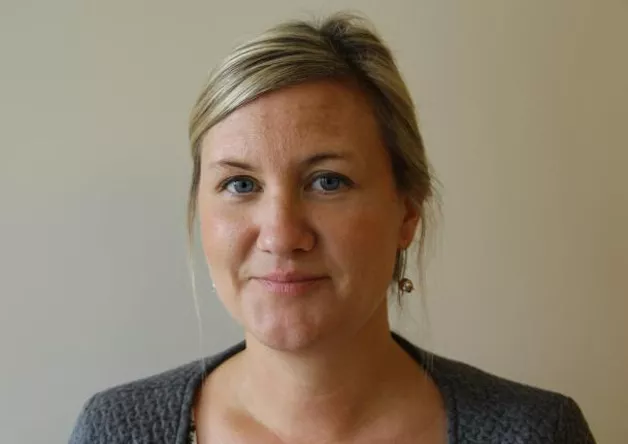Meet our researchers: with blunt elbows
- FOR BETTER MENTAL HEALTH
A friendly ideas woman who knows to surround herself with other facilitators. Elisabeth Argentzell, occupational therapist and researcher, combines teaching and research with significant networking on and for improved mental health. She is happy that the initiative Balancing Everyday Life and the new occupational category Peer Support have been introduced in psychiatry. At times, she grinds her teeth over how difficult it is to demonstrate scientific evidence with regard to human wellbeing.
“However, I cannot imagine anything more enjoyable than being able to do research. It is such a privilege.”
Elisabeth Argentzell is a qualified occupational therapist who has worked in both oncology and hospice care, as well as in both outpatient psychiatric care and emergency inpatient care. She has now put the clinical work on hold to research and teach in occupational therapy. Her main field of research is recovery in everyday life for people with mental illness.
There is clinical recovery, where the aim is to be symptom-free and the tool is medicine. However, Elisabeth Argentzell focuses on personal recovery, which is about providing the patient with increased control over their own rehabilitation and instilling hope about a good life despite the symptoms. One of the focus points is to try to understand and really listen so that the patient can make their own story understandable.
Peer support – new help that needs to be evaluated
“I always say to my students before a meeting with a client: if you do not have time to listen – you pretend that you do! Fake it. You will never be told any stories if you look stressed.”
Evaluation of peer support is one of the many projects that Elisabeth Argentzell is involved in. This relatively new occupational category within psychiatry consists of peer supporters with personal experience of mental illness. As with so much else in this field of research, it is difficult to demonstrate scientifically how much – or even if – peer support is effective.
"You will never be told any stories if you looked stressed."
“I like RCTs (randomised controlled trials). ‘We measure here, we measure there and then we get these results.’ However, peer support is something entirely new that was introduced spontaneously in activities, so we are now looking primarily at the implementation that takes place and collecting patient stories about the initiative to understand the kind of help that peer support provides. At the same time, discussions are taking place in the research team: how do we optimally measure the happiness a patient may feel when they are able to mirror their experience in someone who understands, someone who can provide hope in a situation that feels hopeless? However, peer support is already in place within psychiatry all across Sweden now, and the experiences are positive.”
A lot is unknown about growing old with mental illness
Another project that Elisabeth Argentzell calls “super exciting” is Sensory Modulation, a project she is running together with a research colleague from New Zealand. People with mental illness are often hypersensitive. In the project, people suffering from mental illness and trauma were interviewed about how they manage their daily lives based on sensory impressions. The aim was to gain an understanding, for example, of which sensory impressions trigger anxiety – and, in the long term, be able to adapt everyday life in the best way through an intervention, something that is now also the subject of a pilot clinical study.
Supporting recovery in vulnerable groups is a recurrent theme in Elisabeth Argentzell’s research. Despite the fact that patients are increasingly given their own voice, prejudices and exclusion due to mental illness is common. This is seen, among other things, in the ongoing project about people aging with mental illness carried out together with Professor Mona Eklund. What happens to them, their wellbeing and their everyday lives when they retire from, for example, the daily activities service and are instead referred to ‘ordinary’ senior citizen activities where other participants are healthy?
“We are following 63-64 year olds who are about to retire. In the preliminary studies, we even found it hard to locate any elderly people. What happens to them after retirement?” asks Elisabeth Argentzell.
Text: Erika Svantesson
Photo: The Swedish Partnership for Mental Health
Links
All links go to Swedish web pages except the link to PubMed.
Balancing everyday life – article on Kristine Lund’s PhD thesis and link to
the main article (Lund University’s popular science website Vetenskap & Hälsa)
Balancing everyday life – link to main article (website PubMed)
Peer support (information on the CEPI web site with additional links)
The CEPI website
Mental health first aid (Lund University’s popular science website Vetenskap &
Hälsa)
Elisabeth Argentzell
Name: Elisabeth Argentzell
Title/occupation: qualified occupational therapist and associate professor in occupational therapy. Employed as an associate senior lecturer at the Department of Health Sciences.
Age: 42
Family: husband, two children and a cat.
Lives: in Lomma on the west coast of Skåne
Some current assignments: teaching within the Balancing Everyday Life project. Teaching, collecting data and supervising about Peer Support. On the board for the CEPI research network. Teaching medical students in Mental Health First Aid.
Superpower: “I am somewhat of an ideas woman. I often come up with research ideas that I can then link together and brainstorm with the right people. I see the possibilities. I also like to live by the motto of working with blunt elbows and to openly support and soak up new research ideas with other research colleagues. It is important for us to move forward together.”
Research I am particularly proud of: the RCT (randomised controlled trial) in the project Balancing Everyday Life led by Professor Mona Eklund. It shows positive, significant results and is often recognised. I am also proud of the fact that 170 occupational therapists have been trained according to Balancing Everyday Life.
Information about Elisabeth Argentzell in the Lund University Research Portal
